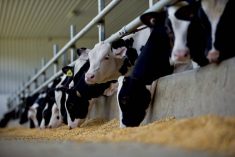The western Canadian feeder cattle market was steady to $2 per hundredweight (cwt) firmer last week for animals in the 6-weights and higher categories; lightweight feeders were up $5-$8/cwt in comparison to the previous week. We saw 700- to 800-pound steers in southern Alberta trade in the range of $116-$126/cwt while lightweights under 400 pounds brought back as much as $170/cwt.
A similar pattern was noted in the U.S. auction markets, with a group of black tanned 340-pound steers selling for over $200/cwt, which is an all-time record high for cattle.
Read Also

Mexico agriculture secretary says still no date for restarting cattle exports to U.S.
Mexican Agriculture Minister Julio Berdegue said on Wednesday that Mexico and the United States have not yet set a date to resume Mexican cattle exports amid an outbreak of the flesh-eating screwworm parasite.
Projections for smaller beef production in the second and third quarters of 2011, along with signs of growing demand, continue to push feeder cattle prices higher.
Equity markets appear to be trending higher, increasing consumer confidence and setting a positive tone for retail consumption. Weakness in the fed cattle market did little to dampen enthusiasm in the feeder sector this past week as feeding margins remain in positive territory.
The function of the feeder cattle market is to encourage production. Previous historical highs are no longer providing sufficient returns to the cow-calf operator; therefore, we are seeing feeder cattle move into a new fundamental price range.
Now that prices are so strong, there is a higher probability that heifer retention will begin in 2011, further tightening the supply situation.
— Jerry Klassen is a commodity market analyst in Winnipeg and maintains an interest in the family feedlot in southern Alberta. He writes an in-depth biweekly commentary, Canadian Feedlot and Cattle Market Analysis, for feedlot operators in Canada. He can be reached by email at [email protected] or 204-287-8268 for questions or comments.
The material contained herein is for information purposes only and is not to be construed as an offer for the sale or purchase of securities, options and/or futures or futures options contracts. While the information in this publication cannot be guaranteed, it was obtained from sources believed to be reliable. The risk of loss in futures trading can be substantial. The article is an opinion only and may not be accurate about market direction in the future. Do not use this information to make buying or selling decision because adverse consequences may occur. This information may be wrong and may not be correct about current market conditions in all areas of Canada. This is an opinion only and not based on verified facts.












